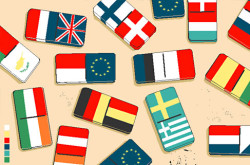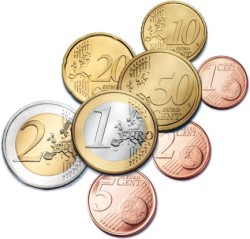Cultural differences will end the Euro
Posted on November 23, 2012 I recently visited the Europe Union of a union of a different sort: a Finnish wedding. Whilst in Finland, as a history buff, I took the opportunity to spend a few days in Rome, Italy. The contrast and history behind Finland, the part of Europe that has been doing well, and Rome, Italy, the part that is struggling with competitiveness and debt, is useful for understanding the present Euro crisis and how it might play out.
I recently visited the Europe Union of a union of a different sort: a Finnish wedding. Whilst in Finland, as a history buff, I took the opportunity to spend a few days in Rome, Italy. The contrast and history behind Finland, the part of Europe that has been doing well, and Rome, Italy, the part that is struggling with competitiveness and debt, is useful for understanding the present Euro crisis and how it might play out.
- Finland was clean, organized and egalitarian. Differences between rich and poor seemed difficult to tell. Service was simple, orderly and efficient. People were polite but formal. Civil utilities and churches tended towards the utilitarian, organized and spare.
- Italy was rather different. Rome airport was passable but signs were lacking and transfers trickier. Taxis often had “broken” meters and people alternated between very friendly and personable, (often it seemed sell or trick you) or completely disinterested. Conflicting information abounded. Conspicuous flashy wealth paraded in the vicinity of poverty and begging. Consumption was celebrated.
The differences between Finland and Italy are a useful summary of differences between the debtor south and the parsimonious north of Europe. Hard working, parsimonious, utilitarian, egalitarian north (Finland, Germany, Scandinavia, Holland) versus the spendthrift, flashy, enjoying their life south (Greece, Italy, Spain and possibly parts of France). The differences might be due to heritage or religion (Protestant north versus Catholic south), but above all they do seem deeply engrained. Definitely cultural.
Despite all the best intentions in the world, it is hard to see sufficient change occurring. In my opinion cultural values don’t change, at least not quickly. They do, for example, have a long demonstrated history. Italy, exemplified by Rome has had a tradition of grand displays of wealth and living the good life, that go back millennia, at least prior to Christ. The evidence was physical and everywhere. The old churches and buildings in Finland by contrast were practical, sparse and simple.
I’m not a believer (pardon the pun) in the explanation of Catholics versus Protestant culture; rather that the religious differences reflect deeper underlying cultural differences. Malcolm Gladwell has argued that rice growing culture in China explains Chinese success at math and cooperative labor, whilst hill herder culture describes the honor oriented approach of the Irish/Scottish in a way that has survived transplantation across to the South of the United States. It’s an interesting and persuasive theory.
 In Europe, I’d argue a deeper culture is at work, again based on climate and circumstance. Being practical, prepared and collaboratively organized is the only way to survive a Finnish or Northern winter where temperatures are well below freezing for months at a time. Egalitarianism and thinking of others is probably a result of being shut inside for 5 months of a year – being selfish and annoying is a sure way to be thrown outside to a certain freezing death.
In Europe, I’d argue a deeper culture is at work, again based on climate and circumstance. Being practical, prepared and collaboratively organized is the only way to survive a Finnish or Northern winter where temperatures are well below freezing for months at a time. Egalitarianism and thinking of others is probably a result of being shut inside for 5 months of a year – being selfish and annoying is a sure way to be thrown outside to a certain freezing death.
In the south, even the poorly prepared can last their short, mild winter. No planning or collaboration is required so minds can be free to wander onto other matters. For example, seeking status through consumption, enjoyment of life and flashy displays of wealth. Another example is the reformation. A significant part of Martin Luther’s protest was the Catholic church’s predilection of the time for selling indulgences. Many people (of course not all) in the south still see the rules, particularly tax rules, as something that doesn’t apply to them. That they can find a way around the rules, being special and taking advantage of a situation, or being forgiven. In global financial terms the closest we think to an indulgence or forgiveness is a unilateral devaluation of a currency. Something that happened regularly across the south prior to the Euro.
The north is not nearly so compromising as the history of the strong Deutschmark shows. I’d argue this difference is still strong, and probably something that will be the key in sinking the good ship Euro.
As Malcolm Gladwell and others have demonstrated, these trends can be long lasting over many generations and centuries. It is hard to imagine a handful of politicians changing something so deeply engrained, even if that were their true desire, which is debatable. Italians and Greeks will remain the same. Many commentators have, correctly, in our opinion at least, diagnosed the south’s problems not as a problem of debt, but ultimately one of competitiveness. In our opinion the source of that problem is a deeper one; an approach to life itself.
If that can’t be changed, and we don’t think it can, then we believe that the “reforms” that have been instituted and are proposed (banking union for example) will be a useful as pumping water from the Titanic; helpful for a time, but ultimately fruitless. The Euro zone seems to be a marriage based on lies (yes, we will balance our budget!) and the lack of trust seems to be growing by the day. All marriages based on lies and lack of trust are doomed. Often the longer it takes, the greater the rancor, and the messier the inevitable divorce. Witness the recent success of ultra-nationalist Golden Dawn in Greece and what it might herald.
Fortunately for my Australian friend and his Finnish bride, they seem to share a lot more culture and values than North and South Europe. My friend should have a long marriage, but divorce in the Euro zone seems inevitable and likely messy.
About Caterer Goodman Partners
Caterer Goodman Partners is a Shanghai based wealth management firm established with a clear vision to provide a new level of personalized financial planning services for expatriates in Asia. Our financial advisors provide guidance for our clients in all areas of investment, specialising in managed accounts, money-market funds, retirement planning and alternative investments. At Caterer Goodman Partners, we offer our advice and experience to provide low cost, tax-effective and simple solutions to match our clients’ interests.
About Owen Caterer
Since graduation Mr Owen Caterer has worked with the Queensland Premier's Department in Trade Facilitation and then as a financial adviser in Shanghai from 2005 until 2010. He then rose to Senior Adviser, then Business Development manager and then to Chief Investment Officer responsible for portfolios to a value of US$280 million across Asia. Following that Mr Caterer left to found his own firm with a partner in the financial advisory and wealth management area. This focused on developing China and Asia's first fee-based financial advisory (rather than commission-based). This has grown to now have 8 staff and and managing almost US$35 million for clients throughout Asia. This business success was recognized as a finalist in the 2013 ACBA in the Start Up Enterprises category and are one of a small number of foreign managed firms to have a full asset management license in China. Owen has also been active in the community volunteering for the Australian Chamber of Commerce in Shanghai and acting as the Vice-Chair of the Small Business Working Group (2012-2014) and as the Co-Deputy Chair of the Financial Services since 2013 until the present. They have continued to grow their business and have now been selected as a small group of companies who are platinum members of the Australian chamber of commerce. The achievement they are most proud of is their efforts to reform the financial planning industry in China and push it away from a hard-sales commission driven model to a more ethical management fee and long term customer service model. Owen has a Graduate Diploma of Applied Finance from the Securities Institute of Australia of which he was a member as a Fellow of Finance for many years and also has an undergraduate degree from Griffith University in International Business. Owen's interests are tennis, running and his wife and two children. He speaks fluent Chinese, first arriving in China in 1997.
Tags: Caterer Goodman, Change, Cultural difference, Euro Crisis, Euro problems, Europe Union, Financial Advice, Investment, Money, Owen, Owen Caterer, Shanghai
Categorised in: Economic Commentary

